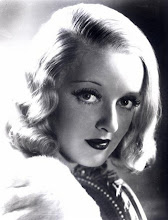The semester's finally over, which hopefully means I'll have a couple of weeks free to catch up on all the TCM I've been missing. I did have the chance to watch one movie in between finals, parties, presentations, and move-out last week, and naturally it was the one starring Bette Davis: Bordertown.
Of course, the film really centers on Paul Muni's character, Johnny Ramirez. After studying for five years to become a lawyer, Johnny's first real case reveals that his education just didn't match up to that of his richer opponent. He devotes himself to earning as much money as possible, and moves from L.A. to a town on the Mexican-American border, where he gets a job working for casino owner Charlie Roark. Now, Johnny didn't leave his law practice behind just to be a bartender -- he climbs the ladder all the way up to the top, becoming Charlie's partner. So our protagonist made good. The end, right?
Not even close. Charlie has somehow (and we're not explicitly told how) procured for himself a young, feisty wife who's quite interested in Johnny -- and who wouldn't be? Marie Roark actively despises her husband, though he's oblivious and Johnny just plays dumb. In fact, Ramirez tells her outright that he's more interested in money than in her, but since the plot wouldn't move very far if she respected that, Marie is just crazy enough not to care, and just crazy enough to do something about it when the opportunity presents itself:
As the film progresses, Marie slowly goes mad with guilt or paranoia, becoming ever more obsessed with the man she killed her husband for. While doing his best to ignore her, Johnny pursues a relationship with the woman who cost him his law career almost as relentlessly as Marie pursues him, although with much better results. Up to a point, at least.
It's impossible to discuss this movie without discussing the ending, so if you haven't seen it this might be your cue to turn elsewhere. For the rest of you: The film seems to be sending mixed messages about the status of Mexican-Americans. On the one hand, Johnny is presented as an intelligent and capable character; his love interests are two white American women, and his friends and employees all seem to like and respect him. On the other hand, there's, well, everything else.
To be fair, although there are incidents of racism scattered throughout the film, it feels much more like an accurate portrayal of the way these characters would act and think than an actual statement the movie is trying to make. Miss Elwell calls Johnny "Savage" because that's how she sees him; the audience is not necessarily meant to agree. Then suddenly at the end, the message is "go back to your own kind," the implication being that Johnny somehow isn't worthy of the society he's been functioning just fine in up until then? It feels like something that was tacked on to appease the general audience of the time, rather than an organic conclusion to the story. It would have felt more natural to have Johnny go back because he had an epiphany about losing sight of the people he'd originally intended to help, making the character come full circle rather than simply hit a brick wall.
Clearly the ending didn't age well at all, but I still enjoyed the movie as a whole. Bette Davis excels at bringing the crazy, and Paul Muni sizzles with every woman he shares screen time with.
Subscribe to:
Post Comments (Atom)



Darn, this is one I missed! I've been very delinquent with the DVR lately..
ReplyDeleteI have this one taped and will come back to read your post once I see it! I promise. ;-)
ReplyDelete